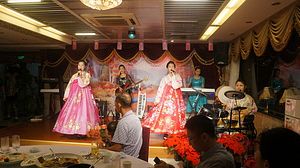In early April, 13 North Korean citizens defected to the South. The case of the 12 women and one man, which South Korean officials said defected from one of North Korea’s overseas restaurants, was unique because all 13 came from the same restaurant. The story become even more interesting this week when Chinese foreign ministry spokesman Lu Kang said that 13 North Koreans “were found exiting the Chinese border with valid passports.” It’s assumed the 13 people South Korea announced had defected are the same 13 China says left legally, although South Korean authorities have not named the country in which the group had worked. South Korean media, however, have pinpointed the defectors as having worked at a restaurant in Ningbo, in the Chinese coastal province of Zhejiang.
“It is worth noting that these people all had valid identity documents with them and exited the Chinese border in accordance with law,” Lu said, stressing that they were not North Koreans who had illegally crossed into China.
Given the heavy militarization of the border with South Korea and scant opportunities to travel abroad, North Korean defectors usually leave via the country’s border with China. Beijing, in the past, has been harsh on North Koreans caught trying to defect via their territory.
In an interview with The Diplomat Magazine last year, Hyeonseo Lee–a well-known North Korean defector and author of a book about her defection–said that in the decade she lived in China after fleeing North Korea (before defecting to South Korea in 2008) she would “constantly wake up in fear of being captured by the Chinese police and send back to a prison camp in North Korea.”
North Korea maintains an estimated 130 restaurants in other countries, mostly in China. The staff are assumed to be selected because of their loyalty. Although individuals have defected to South Korea from such restaurants in the past, this month’s 13 are unique in that they defected as a group. The culture of paranoia engendered by Pyongyang in the country’s citizens, makes such group defections rare. How to plan something like that when anyone might turn you in for suggesting it?
Although defections have been slowing since a peak in 2009–when 2,914 defected–the South Korean unification ministry says defections are up 17.5 percent in the first three months of 2016 in comparison to 2015. That statistic does not include the 13 who, according to the Chinese, legally exited China.
While the 13 restaurant workers are remarkable for their number (and China’s statement on the defection), South Korea recently confirmed that last year two senior North Korean officials defected. One had been a colonel in Pyongyang’s spy agency, the General Reconnaissance Bureau, and the other a diplomat in an unnamed African country.
The colonel’s defection, in particular, could yield lucrative intelligence for Seoul.

































